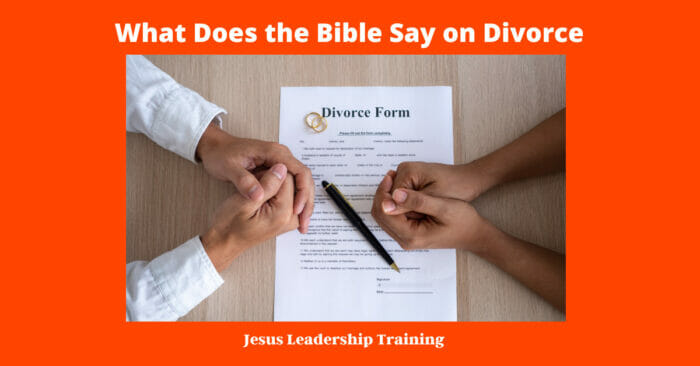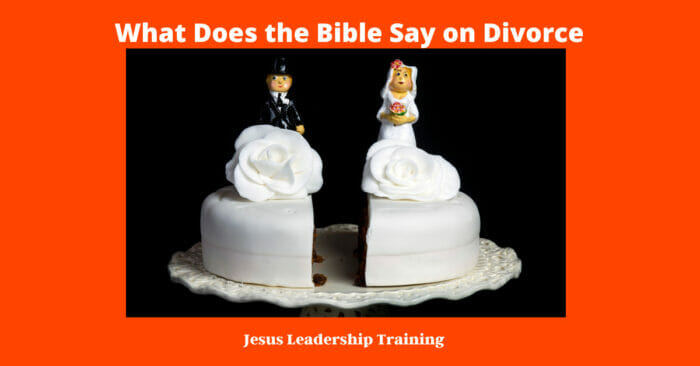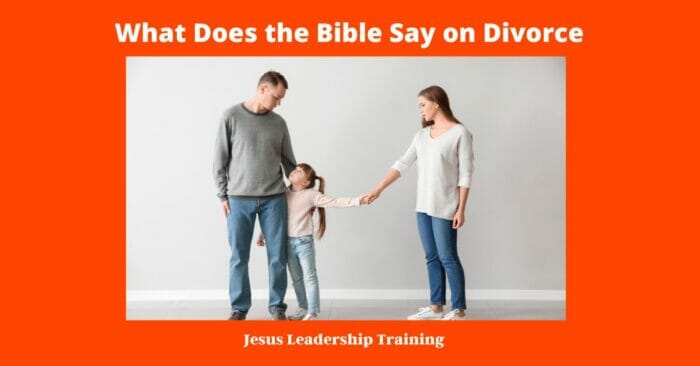What Does the Bible Say on Divorce – The Bible speaks extensively on the subject of divorce, particularly in the New Testament where Jesus outlines his stance on the matter. According to Jesus, divorce is discouraged except in cases of adultery. However, the Old Testament book of Deuteronomy also mentions divorce as an option, although it is not as clear-cut as Jesus’ teaching.
Divorce is not seen as a sin in the Bible, but rather as a difficult and sometimes necessary decision. The Bible acknowledges the realities of the human condition and allows for divorce when the alternative is living in a state of misery. The Bible encourages couples to seek counseling and reconciliation, but ultimately it allows them the freedom to make their own decisions.
Table of Contents
What Does the Bible Say on Divorce
Divorce is a difficult and controversial topic that has been debated since the time of ancient civilizations. While divorce is a legal action that eliminates a marriage, what does the Bible say about it? In this blog post, we will examine the various teachings around divorce in the Bible and the way these teachings have been interpreted over the centuries.
Divorce According to the Bible
Divorce is not specifically mentioned in the Bible. The term “divorce” as we know it today did not exist in biblical times, and was only introduced in the Middle Ages. However, there are references to divorce in the Bible, including in the books of Leviticus, Deuteronomy, and Matthew.

Divorce in the Old Testament
In the Old Testament, divorce was allowed in certain circumstances, such as if a wife was found to be unfaithful to her husband. In the book of Deuteronomy, it is written that a man may divorce his wife if he finds something “unclean” about her. This could be interpreted as a reference to adultery.
Divorce in the New Testament
In the New Testament, Jesus appears to be stricter on the issue of divorce. He states in the book of Matthew that it is not permissible to divorce unless the marriage has been broken due to adultery.

Hebrew Words For Divorce
The Hebrew words for divorce in the Old Testament are “shalach” and “keritut.” The former means to “send away” while the latter means to “cut off.”
- Get (Gittin): The formal Jewish divorce document.
- Ketubah: The prenuptial agreement signed by the couple at the time of marriage.
- Gerushin: The process of formally sending the Get from the husband to the wife.
- Hefker: The term for the state of being divorced, when the wife is no longer legally bound to the husband.
- Agunah: A woman whose husband cannot be located and so cannot grant her a divorce.
- Sfek Sfeka: An ambiguous situation that requires the court to make a decision as to whether the divorce will be granted or not.
- Guf Naki: An undefiled divorce in which the husband and wife are not seeking a Get but rather a court order ending the marriage.
- Chazakah: The legal presumption that a marriage is still valid until proven otherwise.
- Bittul Get: The act of nullifying a Get by the husband.
- Bitul Ketubah: The act of nullifying a Ketubah.

Greek Words for Divorce
The Greek word for divorce in the New Testament is “apoluo” which means to “release” or “loosen.”
- Apoluo: This verb is used to signify the dissolution of a marriage, and the granting of a divorce.
- Chorizo: This verb means to separate, or to divide. It is often used to describe the separation of two people in a marriage.
- Aphesis: This refers to a legal action that dissolves a marriage. It is often used in reference to the granting of a divorce.
- Apokatastasis: This term is used to refer to the process of divorce, or the termination of a marriage.
- Anapipto: This verb means to revoke, or to annul. It is often used when discussing the termination of a marriage.
- Katathesis: This term is used to refer to the dissolution of a marriage. It is often used in reference to the granting of a divorce.
- Anaireo: This verb means to cancel, or to revoke. It is typically used when talking about dissolving a marriage.
- Aphiemi: This refers to the legal action of granting a divorce. It is often used when discussing the termination of a marriage.
- Choreo: This verb means to separate, or to divide. It is often used when discussing the termination of a marriage.
- Apheggomai: This verb means to be released from, or to be separated from. It is often used when discussing the termination of a marriage.

Aramaic Words on Divorce
The Aramaic word for divorce in the New Testament is “gharith,” which means to “dismiss” or “to send away.”
- Gittin/Gittinin: This is the Aramaic word for divorce. It is used in rabbinical literature in both singular and plural form. The verb gittin means “to cut off” or “to separate.”
- Ketubah: This is an Aramaic word for a marriage contract. It outlines the conditions of the marriage, including the rights of the wife and husband in the event of a divorce.
- Get: This is the Aramaic word for a document that dissolves a marriage. It is signed by two rabbis and is written in Aramaic.
- Iggeret: This is the Aramaic word for a letter that is sent to the husband informing him of the divorce.
- Nissuin: This is the Aramaic word for the marriage ceremony. It is a ritual that takes place in front of two witnesses.
- Shtar: This is the Aramaic word for a document that is used to transfer ownership or rights. In the case of divorce, it is used to transfer the rights of the husband and wife in the divorce settlement.
- Peṭaḥ: This is the Aramaic word for an agreement. In the case of divorce, it is used to settle any disagreements or disputes between the husband and wife.
- Ma’aser: This is the Aramaic word for the division of property in a divorce. It is usually determined by the court.
- Ḥalitsah: This is the Aramaic word for the ceremony of ceremonial divorce. It is conducted by a rabbi and involves the husband giving the wife a document of divorce.
- Chalitzah: This is the Aramaic word for the ceremony of symbolic divorce. It involves the husband giving the wife a shoe as a symbol of the divorce.
Jewish View on Divorce in 1st Century
In the 1st Century, the Jewish view on divorce was that a man could divorce his wife for any reason, however a woman could not divorce her husband except for adultery.
Compare how the the Nation Felt on Divorce during the Life of Jesus
Divorce was a hot topic in the time of Jesus, with different opinions on the subject held by the various religious and political groups of the day. The Pharisees, Sadducees, Essenes, and Romans all had different views on the matter, while Jesus had his own distinct perspectives on divorce. In this blog post, we’ll take a look at how these different groups felt about divorce during the life of Jesus and compare their attitudes.
The Pharisees were one of the leading religious groups of the time, and their opinion on divorce was largely a reflection of their interpretation of Old Testament laws. They believed that divorce was only permissible in cases of adultery, and that a man could not divorce his wife for any other reason. The Pharisees also believed that women should not be allowed to divorce their husbands, even in cases of adultery.
The Sadducees were another prominent religious group in the time of Jesus. They had a more liberal view of divorce, allowing it in cases of infidelity as well as other reasons. This group also believed that women should be allowed to initiate a divorce, although the man was still required to give consent.
The Essenes were another group of religious scholars during the life of Jesus. They had a much stricter view of divorce than the Pharisees or Sadducees, believing that it was only permissible in cases of adultery. They also believed that a man should not be able to divorce his wife for any other reason.
The Romans had their own view of divorce during the life of Jesus as well. Unlike the other religious groups, they believed that divorce was permissible for any reason, including incompatibility. This was in stark contrast to the attitudes of the other religious groups, who believed that divorce should only be allowed in cases of adultery.
Finally, Jesus had his own unique perspective on divorce. He disagreed with the views of the Pharisees, Sadducees, and Essenes, believing that divorce was permissible in cases of incompatibility as well as adultery. Jesus also believed that women should be allowed to initiate a divorce, although the man would still need to give his consent.
To sum up, the various religious and political groups of the time had different views on divorce during the life of Jesus. The Pharisees, Sadducees, Essenes, and Romans all had their own distinct opinions on the matter, while Jesus had his own unique perspective. All in all, it is clear that the nation felt differently about divorce during the life of Jesus.
Bible Verses on Divorce
There are several Bible verses that deal with divorce. Some of the more well-known verses include:
-Matthew 19:3-9
-Deuteronomy 24:1-4
-Malachi 2:16
-Mark 10:2-12
-Luke 16:18
God’s View on Divorce
God’s view on divorce is clear in the Bible: He hates divorce and considers it a sin. He desires that marriages be permanent and that couples stay together. He also desires that couples work at healing and reconciling their marriages rather than giving up and divorcing.
Marriage in the Bible and Divorce
The Bible speaks of marriage as a covenant between a man and a woman. It is designed to be permanent and unbreakable, and God desires that couples work to keep their marriage intact. However, divorce is not necessarily forbidden, and there are certain circumstances where divorce may be permissible.
Saving a Marriage and Divorce
The Bible offers advice for couples who are struggling in their marriage. It encourages couples to seek help from a marriage counselor or pastor and to work at resolving their issues. It also encourages them to be patient and forgiving with each other, and to remember that God is always there to help and support them through their struggles.
Spouse(s) and Divorce
The Bible says that a person should not enter into a marriage lightly, as it is an important commitment. It also states that a person should not divorce their spouse, except in cases of adultery. It also encourages couples to forgive each other and to seek help from a professional if needed.
Divorce in the Church
The Bible does not specifically address divorce in the Church, but it does state that pastors should be available to counsel couples who are considering divorce and to provide them with spiritual guidance. It also encourages the Church to support couples who are struggling in their marriage and to help them work through their issues.
Biblical Advice on Divorce
The Bible offers several pieces of advice on divorce. It encourages couples to seek help from a professional and to work on resolving their issues. It also states that couples should forgive each other, and not enter into a marriage lightly. It also states that a person should not divorce their spouse, except in cases of adultery.
Final Thoughts – What Does the Bible Say on Divorce
Divorce is not specifically mentioned in the Bible, but there are references to it in the Old and New Testaments. The Old Testament allows divorce in certain circumstances, while the New Testament appears to be stricter, only allowing divorce in cases of adultery. The Bible also states that God hates divorce, and He desires that couples work to save their marriages. It also encourages couples to seek help from a professional if needed, and to forgive each other. The Church should also be available to offer spiritual guidance and support to couples who are considering divorce.




